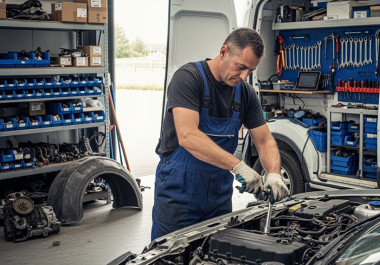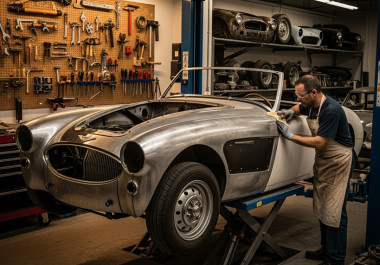It’s a question we hear a lot from customers navigating our online car auctions – and we can understand why! When buying a used car, the matter of its mileage is usually one of the first questions that typically comes to mind. That’s largely because the number of miles a car has driven is often seen as a direct reflection of its condition and value, especially with older vehicles. But how much does mileage really matter, and should it be the deciding factor?
Well, as with so many of these sorts of decisions, ultimately the answer is rather up to you. But whichever way you’re leaning, here are some of the most important things you need to know.
Why is car mileage so important?
Car mileage plays a critical role in assessing a vehicle’s overall health and longevity. Essentially, it’s a measure of how much use a car has had, which means it can provide a useful insight into how well the car has been maintained. Lower mileage is often associated with less wear and tear, suggesting a longer lifespan ahead, while higher mileage can signal that the vehicle may have more wear, and require more attention accordingly.
As we’ve touched on above, for many buyers the mileage number is one of the first things they check, and for good reason. Cars with higher mileage are generally more prone to issues like engine wear, transmission problems, and other mechanical concerns. But it’s also worth bearing in mind that mileage alone isn’t a foolproof indicator of a car's true condition – how much it’s been driven, maintained, and serviced over the years are all factors that matter just as much.
How mileage affects the engine's health
As a car racks up more and more miles, its engine and other crucial components inevitably go through wear and tear. This is especially true for older cars, where mileage can be a significant factor in determining whether the engine is still in good shape. For example, a car that has consistently been driven on long, motorway journeys may have experienced less strain on its engine compared to one that’s mostly been used for short city trips.
Engines with high mileage can often show signs of wear, including lower compression, increased oil consumption, and potential valve or gasket issues. Over time, the seals and gaskets in the engine can deteriorate, leading to oil leaks or engine misfires. Putting particularly high-mileage cars back on the road can sometimes be difficult, as replacing or repairing major engine parts can be costly.
However, that’s not to say that high-mileage cars aren’t worth considering at all. In fact, older vehicles with high mileage can still be reliable if they’ve been well-maintained. Regular servicing, timely oil changes, and prompt repairs can all go a long way to significantly extending the life of an engine, even at higher mileages.
What high or low mileage means for older cars
High-mileage cars tend to have more wear on critical components, including the engine, transmission, and suspension. As these parts age, they’re more likely to need attention, such as replacing worn-out parts or dealing with leaks and breakdowns. However, it’s worth us repeating that a high mileage isn’t always a dealbreaker, provided the car has been well cared for. A high-mileage car with a comprehensive service history could still have plenty of life left in it.
On the other hand, a low-mileage car can look appealing, but it doesn’t necessarily mean it’s a better option. Cars that aren’t driven often may develop problems of their own, especially if they’ve been sitting idle for extended periods. Components like rubber seals, hoses, and gaskets can deteriorate when not regularly used, leading to leaks or issues starting the engine. So, while low mileage might suggest less wear on the engine, it’s not always a guarantee of a car in top condition.
What to look for in high-mileage cars
If you’re considering a high-mileage car, and you’re planning on driving it rather than taking it to pieces for parts, it’s always a good idea to do a thorough inspection to ensure that it’s worth the investment. Regular oil changes, timely transmission servicing, and other essential maintenance tasks can significantly extend the life of a car, even with high mileage, so if you can get hold of a service history at all, they’re always helpful!
It’s also worth bearing in mind that the reason some cars accumulate high mileage is that they’re reliable enough to handle long-distance driving year after year. With proper maintenance, lots of cars can continue to perform well beyond the 100,000-mile mark.
So, you’ll want to pay close attention to any signs of wear, such as unusual engine noise, leaks, or an excessive amount of exhaust smoke. If you can, take a look at the suspension and brake system, as these parts tend to wear out faster than others and can become costly to replace.
Just in general, it’s a good idea to consider how much work you’re seriously willing to put into it, when it comes right down to it. Some high-mileage cars, especially those with solid maintenance records, can still offer great reliability and performance for many more miles.
And of course, if you’re ready to start your search in earnest, you’re in exactly the right place. We take pride in providing you with a huge range of salvage cars to choose from in our online car auctions, including not just models from the likes of Mercedes and Honda, or Ford and Volkswagen. Our auctions are refreshed on a daily and weekly basis, so there are always bargains to be found. Why not take a look around, and see what you can find?




